- Home
- Undergraduate
- Academics
- History
History
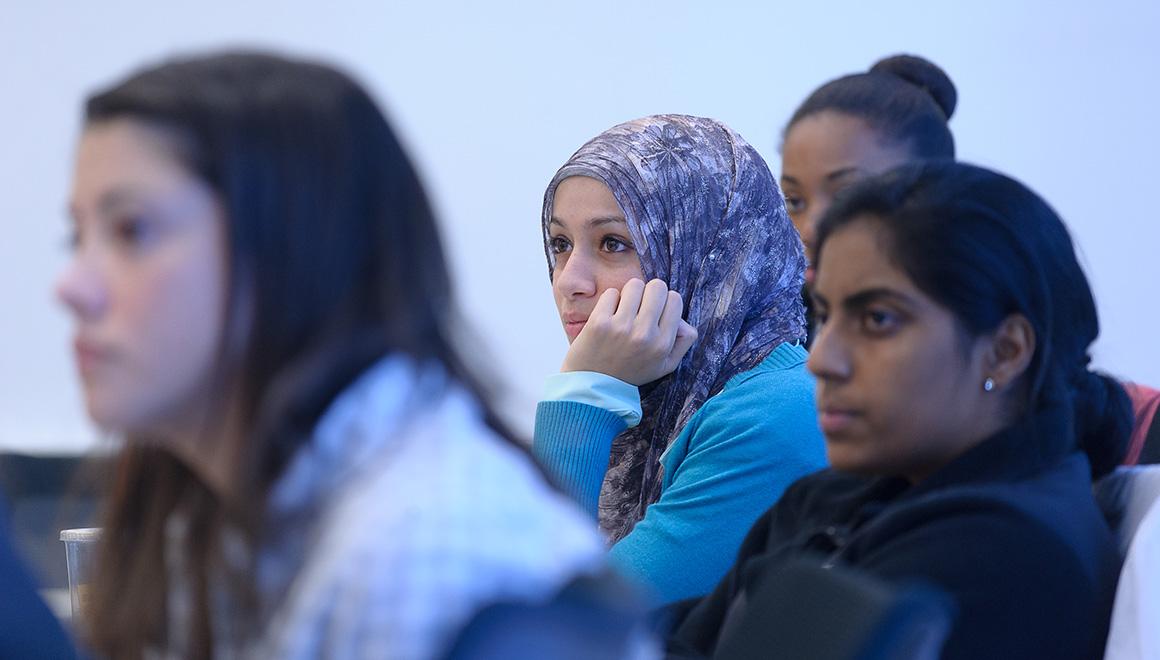
Do you want to make history?
Studying history reveals the changes and continuities that ebb and flow around us. Diseases, agriculture, civil rights, childrearing practices, political dynasties, and furniture all have histories. The past shapes the present, from the environment to forms of government, to the way we think about gender and race.
Our faculty will introduce you to a variety of time periods, regions, and approaches to history. You'll learn how history is made through your own investigation of the past. Choose courses that follow a theme: revolutions, a geographic focus like East Asia, or an era like the 20th century. You'll refine and apply your knowledge through research projects and internships.
Follow your passion while developing valuable skills in critical reading, writing, research, and analysis. Our graduates build fulfilling and versatile careers as teachers, lawyers, librarians, archivists, consultants, and museum curators, as well as in business, healthcare, and government.
Category I: Introductory level
Any three courses chosen from the following:
| HIST100 | World History to 1500 | 4 |
| HIST101 | World History II | 4 |
| HIST118 | Latin American History | 4 |
| HIST128 | Modern European History 1789-1989 | 4 |
| HIST140 | Early American History | 4 |
| HIST141 | Modern American History | 4 |
Students considering a major in history should complete Category I by the end of their sophomore year. History majors may substitute other history electives for survey courses if they have received a grade of four or five on an advanced placement exam in history, or a score of 5, 6, or 7 on an international baccalaureate exam in history.
Category II: Specialization
Three courses with a specific focus defined by the student. This focus may be geographical (such as Asia, Europe, or the U.S.), thematic (such as race, gender, or revolution) or temporal (such as modern). One course in Category I may count in Category II. A specialization in public history requires four of the following, with HIST 253 ideally as the first course:
| HIST205 | Global Environmental History | 4 |
| HIST252 | History & Material Culture | 4 |
| HIST253 | Introduction to Public History | 4 |
| HIST254 | History Through Novels & Film | 4 |
| HIST368 | Seminar in Public History: Sites of History | 4 |
| HIST370 | Internship | 4 |
HIST 368 and HIST 370 may count as Category V
Category III: Breadth
Three courses selected from the three required topic areas below.
One course with a focus on race and ethnicity history:
| HIST118 | Latin American History | 4 |
| HIST201 | Japanese History: Politics, Society, and Everyday Life | 4 |
| HIST202 | Asia to the Eighteenth Century | 4 |
| HIST203 | Power & Culture: East Asia | 4 |
| HIST206 | Rise of Modern China | 4 |
| HIST210 | African American Experience | 4 |
| HIST211 | Medicine and the African American Experience | 4 |
| HIST213 | Race and Ethnicity in U.S. History | 4 |
| HIST217 | Caribbean History | 4 |
| HIST231 | Understanding Islam & Historical Perspectives | 4 |
| HIST237 | Holocaust | 4 |
| HIST240 | The Atlantic World 1500-1800 | 4 |
| HIST275 | The Black Freedom Movement: From Civil Rights to Black Lives Matter | 4 |
One course in early or pre-modern history:
| HIST202 | Asia to the Eighteenth Century | 4 |
| HIST205 | Global Environmental History | 4 |
| HIST207 | Family, Gender, and Sexuality in Chinese History | 4 |
| HIST222 | Greek & Roman History | 4 |
| HIST223 | Medieval History | 4 |
| HIST224 | The Renaissance | 4 |
| HIST231 | Understanding Islam & Historical Perspectives | 4 |
| HIST240 | The Atlantic World 1500-1800 | 4 |
| HIST241 | Revolutions in the West | 4 |
| HIST371 | Seminar in Early American History | 4 |
One course in historical gender studies:
| HIST200 | What is Feminism? Origins of Feminist Thought | 4 |
| HIST204 | Japanese Culture: Gender, Family and Society | 4 |
| HIST207 | Family, Gender, and Sexuality in Chinese History | 4 |
| HIST215 | Women and Gender in U.S. History Before 1890 | 4 |
| HIST216 | Women and Gender in U.S. History Since 1890 | 4 |
| HIST230 | Women and Gender in Europe | 4 |
| HIST239 | History of Sexuality and the Family | 4 |
| HIST360 | Seminar in the History of Women and Gender 1790-1920 | 4 |
Category IV: Methods
All majors must take HIST 260 in their sophomore or junior year.
| HIST260 | Interpreting the Past: The Craft of History | 4 |
By petition, students in the accelerated BA/MA History program may count HIST 397 to fulfill the Methods requirement for the undergraduate major.
Category V: Capstone
At least one history course at or above the 350 level: this requirement may be fulfilled with a seminar, an internship, a thesis, or an independent study. Majors must declare how they plan to fulfill the independent learning requirement before the end of their junior year.
A minor in history consists of five courses, at least one of which should be at the 100-level and at least two at the 200-level.
You'll work closely with your advisor to develop a program that's tailored to your interests and career goals. We encourage you to augment your required courses with in-depth study in the liberal arts and additional courses in the major. Dual degrees, interdisciplinary programs and a wide range of minors — including a minor in public history and a minor in gender history — are also available.
We also offer a minor in history for students pursuing other majors. Students choosing a minor in history are required to take five courses, at least one of which should be at the 100 level and at least two at the 200 level.
Internships and research are central to our program. You'll gain practical experience while refining your focus and making connections with leaders in the field. Internships may take place in film or television studios, or in some of the Greater Boston Area's museums, archives, historic buildings and other historical sites. Recent internship sites include:
- Plimoth Plantation
- The Paul Revere House
- The Simmons University Archives
- The African Meeting House
- The Mary Baker Eddy Library
- John F. Kennedy Presidential Library and Museum
Career Opportunities for Graduates
- Researcher, interpreter, or publicist at an historic house.
- Public relations work for a museum or historic site such as the Old South Meeting House, the Black Heritage Trail, or the Women's Heritage Trail in Boston.
- Developing websites or films about sites such as the sloop Adventure in Gloucester and Lowell Industrial Park.
Spotlight on History Students and Alums

Simmons Alumna Connects with Culture to Inspire Others
Kaitlin Benton received a Bachelor of Arts degree in history and art history from Simmons University. While attending the University, Benton worked as one of the Trustman Art Gallery Assistant and Curatorial Fellows. Since January 2025, Benton has served as Department Coordinator for the Art of Asia and Art of Global Africa at the Museum of Fine Arts, Boston.

Six Students Selected for the 2025 Senior Scholar Award
Ginjer Doherty ’25, Aviva Foster ’25, CJ Haggard ’25, Theo Hatfield ’25, Lili Malatinszky ’25, and Grace Walters ’25 have been selected for the prestigious Senior Scholar Award at Simmons University. Sponsored by the Provost’s Office and the Office of Research and Fellowships, the Senior Scholar Award recognizes outstanding scholarly research across different disciplinary fields.
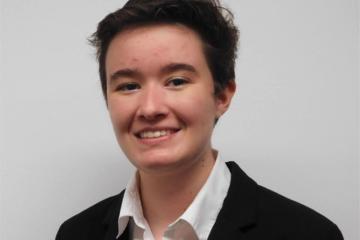
A Queer History of Simmons
History Major Kaz Gebhardt '25 researches the queer foundations of decades-old Simmons traditions.

Undergraduate Recipients of 2023 Senior Scholar Award
Six seniors across the University have been selected as recipients of the 2023 Senior Scholar Award, in recognition of outstanding scholarship and contribution to a field of study.

Ifill Scholar Kate Benton ’24 Pursues a Global Approach to Art History
What professors have helped you pursue your goals? I would like to acknowledge Assistant Professor Asiel Sepúlveda and Associate Professor Sarah Leonard for their support throughout my academic career thus far. Both professors have pushed me to sharpen my critical...
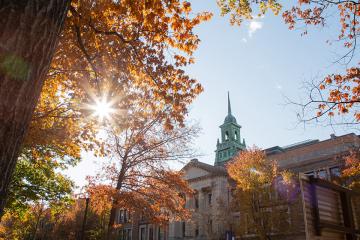
Passionate Leaders Project: Fall 2021 Cohort
The Passionate Leaders Project supports undergraduate students seeking to enrich their academic and professional interests by funding learning opportunities beyond the boundaries of the traditional classroom. Learn what the Fall 2021 Cohort is up to!
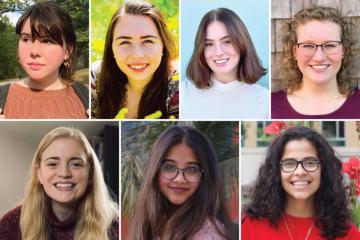
Passionate Leaders Project: Spring 2021 Cohort
The Passionate Leaders Project supports undergraduate students seeking to enrich their academic and professional interests by funding learning opportunities beyond the boundaries of the traditional classroom. Learn what the Spring 2021 cohort is up to!
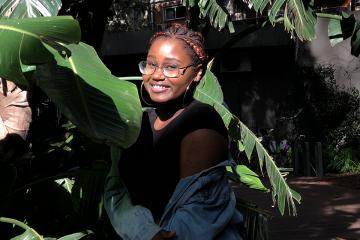
Combating Stereotypes of Black Women with Halley Jeremie '21
Halley Jeremie '21 was selected to present at the 2021 Undergraduate Symposium! Learn more about her project, "The Futility of Respectability Politics in Combating Stereotypes of Black Women."
Our Faculty
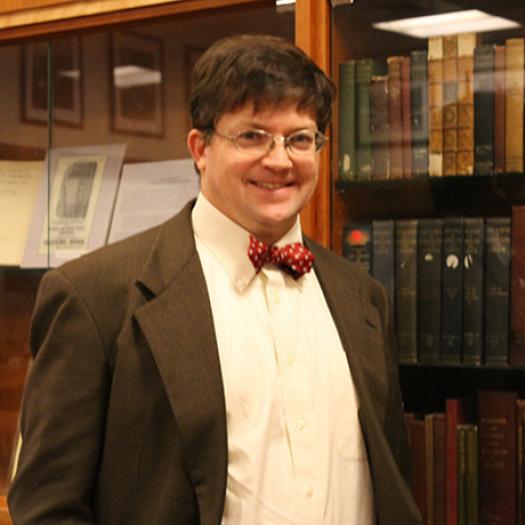
Steve Berry
Associate Professor and Undergraduate Program Director of History

Sarah Leonard
Associate Professor

Stephen Ortega
Professor Emeritus
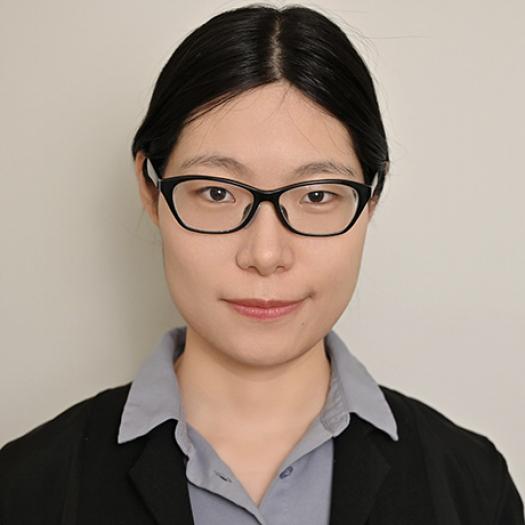
Yunxin Li
Assistant Professor and Interim Graduate Program Director of History
Related Programs
Undergraduate
-
Africana StudiesBA, Minor
- BA
- Minor
-
Gender HistoryMinor
- Minor
-
International RelationsBA Concentration, Minor
- BA Concentration
- Minor
-
PhilosophyMinor
- Minor
-
Public HistoryMinor
- Minor
-
SociologyBA, Minor
- BA
- Minor
-
Women’s, Gender, and Sexuality StudiesBA, Minor
- BA
- Minor
